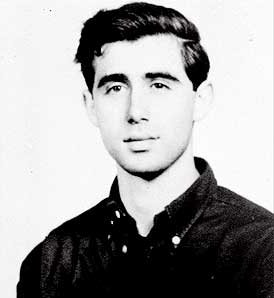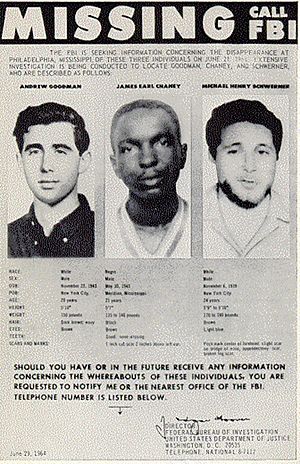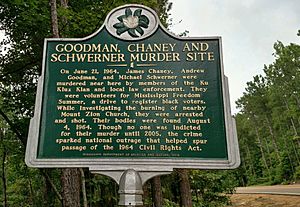Andrew Goodman (activist) facts for kids
Quick facts for kids
Andrew Goodman
|
|
|---|---|
 |
|
| Born | November 23, 1943 New York City, U.S.
|
| Died | June 21, 1964 (aged 20) |
| Cause of death | Murder |
| Education | Walden School Queens College, New York City |
| Occupation | Social worker, Civil rights activist |
| Parent(s) |
|
| Awards | Presidential Medal of Freedom (Posthumous; 2014) |
Andrew Goodman (born November 23, 1943 – died June 21, 1964) was an American who worked for civil rights. He was one of three civil rights workers killed in Philadelphia, Mississippi in 1964. They were murdered by members of the Ku Klux Klan during a project called "Freedom Summer."
Contents
Goodman's Early Life and Education
Andrew Goodman grew up in New York City. He was the second of three sons born to Robert and Carolyn Goodman. Like his fellow activist Michael Schwerner, Andrew was Jewish. His family and community believed strongly in social justice and working for a better society.
Andrew went to the Walden School, which was a progressive school. This school greatly shaped his views on the world. He briefly attended the University of Wisconsin–Madison. Later, he enrolled at Queens College, New York City, where he was friends with the musician Paul Simon.
Andrew became interested in poetry. One of his poems was published after his death. He also had some experience as an actor. He first planned to study drama but later changed his focus to anthropology, which is the study of human societies and cultures. This interest grew as he became more serious about political issues.
Goodman's Civil Rights Work
In 1964, Andrew Goodman volunteered for a project called "Freedom Summer." This project was organized by the Congress of Racial Equality (CORE). Its main goal was to help Black people in Mississippi register to vote. At that time, many Black citizens were prevented from voting.
Andrew joined other activists like Michael Schwerner, his wife Rita Schwerner Bender, and James Chaney. He trained in Oxford, Ohio, to learn civil rights strategies. In June, Andrew went to Meridian, Mississippi, where Michael Schwerner was leading the local office. They worked in rural areas, helping Black people sign up to vote.
The Mississippi State Sovereignty Commission
The Mississippi State Sovereignty Commission was a state agency that strongly opposed integration and civil rights. It paid spies to find out who was involved in activism, especially people from outside the state. Records later showed that this commission shared information about civil rights workers with the Neshoba County Sheriff. The sheriff was later found to be involved in the murders.
On June 21, 1964, Andrew, Michael Schwerner, and James Chaney went to Philadelphia, Mississippi. They were investigating the burning of a Black church. This church had agreed to be a place for a religious school and voter registration efforts.
Arrest and Murder

On their way back to Meridian, the three men were stopped by Deputy Sheriff Cecil Price. Price was a member of the Ku Klux Klan. He arrested them, claiming they were speeding. They were taken to jail in Neshoba County. James Chaney was charged with speeding, while Andrew and Michael were held "for investigation."
After Chaney paid a $20 fine, all three men were released. They were told to leave the county. Deputy Price followed their car. He caught up to them before they could reach the safer Lauderdale County. Price ordered the three men out of their car and into his patrol car. He drove them to a deserted area. Other Klansmen followed in two cars.
Price handed the three men over to the Klansmen. After beating James Chaney, the Klansmen shot and killed Schwerner, Goodman, and Chaney. Their bodies were later found buried in an earthen dam.
Investigation and Justice
The murders of Andrew Goodman, James Chaney, and Michael Schwerner had a big impact on the Civil Rights Movement. The FBI got involved in the case after the men disappeared.
The U.S. government prosecuted the case. The Neshoba County deputy sheriff and six other people involved were found guilty of violating the civil rights of the men. However, they were not convicted of murder at that time.
Reopening the Case
Years later, journalist Jerry Mitchell wrote many articles about the case. He found new evidence and witnesses. This helped put pressure on the state to take action. A high school teacher, Barry Bradford, and his students also helped. They made a documentary that presented new evidence. They even interviewed Edgar Ray Killen, who was involved in the murders. This helped convince the state to reopen the case.
On January 7, 2005, Edgar Ray Killen was arrested. On June 21, 2005, exactly 41 years after the murders, he was found guilty of three counts of manslaughter. Manslaughter is a lesser charge than murder. He was sentenced to sixty years in prison. He died in prison in 2018.
On June 20, 2016, the federal and state investigations into the "Mississippi Murders" were officially closed.
Goodman's Legacy and Honors
In 1966, Andrew's parents, Robert and Carolyn Goodman, started The Andrew Goodman Foundation. They wanted to continue their son's work and spirit. Today, the foundation works to support college students who are continuing the work of Freedom Summer. One of their programs is called "Vote Everywhere."
Andrew Goodman has been honored in several ways:
- In 2002, a mountain in the Adirondack Mountains in New York was named Goodman Mountain in his memory. His family had spent summers there for 30 years.
- The Walden School, where Andrew studied, named its middle and upper school building after him.
- In 2014, Andrew Goodman, along with James Chaney and Michael Schwerner, received the Presidential Medal of Freedom. This is one of the highest civilian awards in the United States. President Barack Obama gave them this award after their deaths.
- A clock tower at Queens College in New York City is named the Chaney-Goodman-Schwerner Clock Tower.
- The song "He Was My Brother," released in 1964 by Simon & Garfunkel, is dedicated to Goodman and other civil rights activists.
|
 | DeHart Hubbard |
 | Wilma Rudolph |
 | Jesse Owens |
 | Jackie Joyner-Kersee |
 | Major Taylor |


